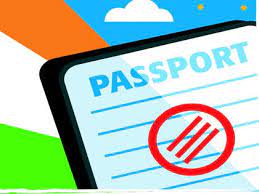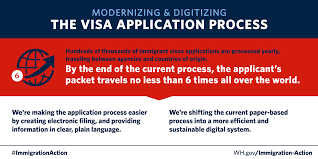visa and immigration process
The visa and immigration process can be complex and challenging, and technology is playing an increasingly important role in facilitating and streamlining the process. From online visa applications to biometric identification systems, technology is helping to simplify and expedite the visa and immigration process for individuals and governments alike. In this article, we will explore the role of technology in the visa and immigration process, and the benefits and challenges of using technology in this context.
Online Visa Applications
Online visa applications are increasingly becoming the norm for many countries, allowing individuals to submit their applications electronically and track the progress of their application online. Online visa applications can save time and reduce paperwork, and can also provide greater transparency and accountability in the visa process. However, online visa applications can also be vulnerable to cyber-attacks and identity theft, and it is important for governments to ensure that their online systems are secure and protected.
Biometric Identification Systems
Biometric identification systems, such as fingerprint and facial recognition technologies, are also being used to verify the identities of visa and immigration applicants. Biometric identification systems can help to prevent fraud and identity theft, and can provide greater accuracy and efficiency in the visa process. However, biometric identification systems can also raise concerns around privacy and civil liberties, and it is important for governments to ensure that their use of biometric data is transparent and accountable.
Electronic Travel Authorization
Electronic travel authorization (ETA) systems are increasingly being used to screen travelers before they arrive in a country, to determine their eligibility for entry and to identify any potential security risks. ETA systems can help to streamline the visa process and reduce processing times, and can also provide greater security and surveillance capabilities. However, ETA systems can also raise concerns around privacy and discrimination, particularly if they are used to target specific nationalities or groups.
Data Analytics
Data analytics is also being used to analyze and manage the large amounts of data generated by the visa and immigration process. Data analytics can help to identify patterns and trends in visa applications, to improve decision-making and resource allocation, and to enhance the overall efficiency and effectiveness of the visa process. However, data analytics can also raise concerns around privacy and the use of personal data, and it is important for governments to ensure that their use of data analytics is transparent and accountable.
Immigration
Blockchain Technology
Blockchain technology is also being explored as a potential solution for the visa and immigration process, particularly in the areas of identity verification and security. Blockchain technology can provide a secure and decentralized platform for storing and sharing personal data, and can help to prevent fraud and identity theft. However, blockchain technology is still in the early stages of development, and it is unclear how it will be integrated into the visa and immigration process in practice.

Technology is playing an increasingly important role in the visa and immigration process, and is helping to simplify and expedite the process for individuals and governments alike. From online visa applications to biometric identification systems, technology is providing new opportunities for greater efficiency, accuracy, and security in the visa process.
However, technology also raises important concerns around privacy, discrimination, and accountability, and it is important for governments to ensure that their use of technology in the visa and immigration process is transparent and responsible. With the right approach and safeguards, technology can help to enhance the visa and immigration process and facilitate the movement of people across borders.
Benefits of Technology in the Visa and Immigration Process
Simplify and Expedite the Process: Technology can help to simplify and expedite the visa and immigration process, by reducing paperwork, streamlining procedures, and providing greater transparency and accountability. This can help to reduce processing times and improve the overall efficiency of the process.
Increase Accuracy and Efficiency: Technology can also help to increase the accuracy and efficiency of the visa and immigration process, by providing tools and systems for identity verification, data analytics, and decision-making. This can help to improve the quality and consistency of decisions, and reduce the risk of fraud and errors.
Enhance Security and Surveillance: Technology can also enhance the security and surveillance capabilities of the visa and immigration process, by providing tools and systems for screening, monitoring, and tracking individuals. This can help to prevent security threats and detect potential risks, and can provide greater protection for national security.
Provide Greater Convenience and Accessibility: Technology can also provide greater convenience and accessibility for individuals applying for visas or immigration status, by allowing them to submit applications online, track the progress of their application, and receive notifications and updates electronically. This can help to reduce the burden and costs associated with the visa process, and provide greater flexibility and control for applicants.

Challenges of Technology in the Visa and Immigration Process
Cybersecurity Risks: Technology can be vulnerable to cyber-attacks and identity theft, particularly in the case of online visa applications and biometric identification systems. Governments and organizations need to ensure that their systems are secure and protected, and that they have measures in place to prevent and respond to cybersecurity threats.
Privacy Concerns: Technology can also raise concerns around privacy and the use of personal data, particularly in the case of biometric identification systems and data analytics. Governments and organizations need to ensure that their use of personal data is transparent, accountable, and compliant with relevant laws and regulations.
Discrimination and Bias: Technology can also raise concerns around discrimination and bias, particularly in the case of electronic travel authorization and data analytics. Governments and organizations need to ensure that their use of technology is fair, objective, and free from bias, and that it does not discriminate against specific nationalities or groups.
Conclusion
Technology is playing an increasingly important role in the visa and immigration process, and is providing new opportunities for greater efficiency, accuracy, and security. From online visa applications to biometric identification systems, technology is helping to simplify and expedite the process for individuals and governments alike.
However, technology also raises important concerns around cybersecurity, privacy, discrimination, and accountability, and it is important for governments and organizations to ensure that their use of technology in the visa and immigration process is transparent, responsible, and compliant with relevant laws and regulations. With the right approach and safeguards, technology can help to enhance the visa and immigration process and facilitate the movement of people across borders.










